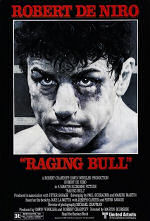|








|
 |
Raging Bull (1980)
    
 |
Directed
by:
Martin
Scorsese |
COUNTRY
USA |
|
GENRE
Biography/Sports/
Drama |
NORWEGIAN TITLE
Den
rasende oksen |
|
RUNNING
TIME
129
minutes |
|
Produced
by:
Irwin
Winkler
Robert Chartoff |
|
Written by (based on
the book by Jake LaMotta):
Paul Schrader
Mardik Martin |
Review
Crisp period cinematography in
black and white effectively transports you back to 1940s New York
City with its jazzy joints, kitchen table discussions, and large enclaves
of Italian-Americans. The fourth teaming of director Martin Scorsese and
actor Robert De Niro sees them venturing into the biography genre for a look at the life and times of former middleweight boxing champ
Jake LaMotta. With the B&W cinematography and lack of
original music, Scorsese's goal was clearly for LaMotta's story to
come off as raw and gritty, while at the same time differentiating his
film from the prizefighter subgenre's traditional rags-to-riches arc
used notably in recent successes such as
Rocky and
The Champ. Despite these stylistic
choices,
Raging Bull is nevertheless a highly traditional biopic, but the
direction is economical and the story at times engaging. The
Scorsese/Schrader partnership was still able to flesh out and shoot
crisp dialogue at this point. Not ingenious, not snappy, but it had a
naturalness to it. And it elevated and was elevated by Scorsese's two
main chummies, De Niro as LaMotta and Joe Pesci as LaMotta's brother Joey.
So far, so good. But as the film progresses, its main impediment becomes
more and more apparent: Jake LaMotta is a rather dull character and his
story never becomes anything special. He's a jealous,
common bully and bore with no discernable characteristics outside of his
antics in the ring. And so when the movie finally ends, you may find
that you're just as
happy to be rid of him as his wife Vickie ultimately was.
Re-reviewed:
Copyright © 08.01.2024 Fredrik Gunerius Fevang
Original review:
Copyright © 02.05.1997
Fredrik Gunerius Fevang
|
[HAVE
YOUR SAY] |
|
|